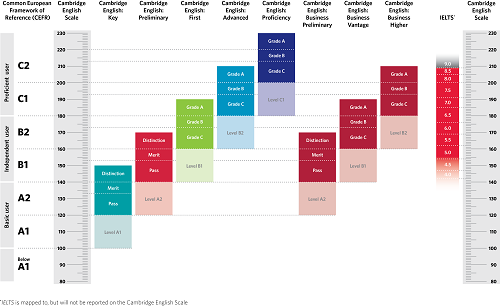

Cambridge English Advanced (CAE) Exam
Naief Khatri

Most universities and colleges that offer admissions to international students hailing from countries where English is not the first language have specific English language proficiency requirements. The Cambridge English: Advanced, also known as Certificate in Advanced English (CAE) is an exam offered by the University of Cambridge ESOL Examinations in 113 countries. Over 3,000 educational institutes, governments and employers around the world, including the United Kingdom, Australia and North America, accept CAE scores for this purpose. For example, the UK Border Agency accepts CAE for student visa applications, and the UK Universities and Colleges Admissions Service (UCAS) awards points towards your college application that correspond to your score in the exam.
If you are planning to study abroad for an undergraduate degree, you may be able to use the scores of CAE as a proof of your English language proficiency, and that you have the necessary skills to study in an English-speaking environment overseas. Other than the CAE, there are other English language proficiency tests that are widely accepted like the TOEFL.
Eligibility criteria
There is no official age limit for taking the exam, and students most commonly sit for the CAE exam while in 10+1 or 10+2 secondary education, in preparation for applying to undergraduate courses in the U.K., Canada and/or Australia. It is however, advised to submit test scores that fall within two years of your application to study abroad.
You can sit for the exam as many times as you require/want, although you cannot register for the same exam twice in the same month.
Exam pattern
You can opt to take either the paper-based or computer-based test by registering at a local test centre nearest to you. CAE consists of five papers that test different areas of language and real-life communication ability, with each paper carrying 20 percent weight of the total marks.
- Reading (one hour 15 minutes; 34 questions): Measures ability to read different types of text like newspapers, magazines and fiction
- Writing (one hour 30 minutes; 2 pieces of writing): Measures written English
- Use of English (one hour; 50 questions): Measures grammar and vocabulary
- Listening (40 minutes; 30 questions): Measures ability to follow everyday conversations
- Speaking (15 minutes; face-to-face with another candidate): Measures effective communication skills
Exam fee
The current fee for both paper-based and computer-based CAE in India is Rs. 6,000.
Scoring method and exam results
Exam results are released in two weeks’ time for the computer-based test while the results of the paper-based test are made available online in four weeks. You will receive a Statement of Result and a certificate, the latter only if you achieve a score of 45 or above.
The Statement of Results contains three pieces of information: score, grade and candidate profile. The score ranges between 0 and 100 and is generated on a scale based on the total marks scored across the five papers. Scores are then awarded a grade based on different ranges. Here’s how your CAE score translates to a grade and its corresponding CEFR (Common European Framework of Reference for Languages) level. The CEFR is the internationally accepted standard for adjudging language skills. Scores between 45 and 59 receive a Level B2 certificate instead of a grade.
Grade | Score | CEFR level |
A | 80-100 | Level C2 |
B | 75-79 | Level C1 Level C1 |
C | 60-74 | |
B2 | 45-59 | Level B2 |
The candidate profile shows individual performance in each of the five tests, and is a useful document if you are asked to show competence in a particular language skill. A certificate stating your grade and/or CEFR level is also issued if you achieve a score of 45 or higher.
For some universities that specify an IELTS band score, you can interpret the Cambridge English: Advanced scores to generate a benchmarked IELTS score through a table provided on the official website. Both CAE and IELTS are products of the Cambridge English Language Assessment, and the scores of the two can be converted to one another.
The university you applied to can also verify your exam results through an online Results Verification Service. You will need to provide your ID Number and Secret Number, both of which you receive at the time of registration to the exam.
Exam schedule and application
The exam is offered 37 times a year with at least one test date every month. There are 25 centres in India that offer the Cambridge English Advanced exam. Locate and contact your nearest test centre from the official Cambridge ESOL website for details on test dates, fees and preparatory test materials. The registration for the computer-based exam can be done within a week’s notice for the computer-based exam.
Click here to download the CAE application form.
The Reading, Writing, Use of English, and Listening tests take place on the same day. The Speaking test may be scheduled a few days before or after the exam date.
Exam dates 2017 for the paper-based CAE in India
EXAM | EXAM DATE | FEES (INR) | REGISTRATION CLOSING DATE |
KET for Schools/PET for Schools | 27 May 2017 | 2800 / 3750 | 14 April 2017 |
| 28 May 2017 | 2800 / 3750 | 14 April 2017 |
| 07 June 2017 | 2800 / 3750 | 28 April 2017 |
| 10 June 2017 | 2800 / 3750 | 28 April 2017 |
| 24 June 2017 | 2800 / 3750 | 12 May 2017 |
| 07 October 2017 | 2800 / 3750 | 25 August 2017 |
| 21 October 2017 | 2800 / 3750 | 08 September 2017 |
| 18 November 2017 | 2800 / 3750 | 06 October 2017 |
| 28 November 2017 | 2800 / 3750 | 20 October 2017 |
| 09 December 2017 | 2800 / 3750 | 27 October 2017 |
Test preparation tips
- To prepare for the exam, take a look at the official Cambridge English preparation materials to familiarise yourself with the test pattern
- Listen carefully to the instructions being given by the interlocutor and pay keen attention to the prompts on the visuals page to clearly understand the requirements of each test task
- No marks are deducted for incorrect responses, and you may answer all questions
- You may use a short pause to gather your thoughts at the start of the Speaking test but take care not to pause for too long
- For the Listening test, work on gathering the gist and meaning of a text, main points and specific information
Contact
Students in India, planning to appear for the Certificate in Advanced English (CAE) can get more details from:
British Council New Delhi
British Council Division
British High Commission
17 Kasturba Gandhi Marg
New Delhi – 110 001
Phone: 18001024353
Fax: +91 11 2371 0717
Email: [email protected]
Sources
“Cambridge certificate in Advanced English (CAE),” British Council India, http://india-dev.bcdigital.info/exams/cambridge-certificate-advanced-english-cae
“Cambridge English Advanced: Brief exam guide,” Cambridge English Language Asessment, http://www.cambridgeenglish.org/images/139150-cambridge-english-advanced-dl-leaflet.pdf
“Cambridge English Advanced: Information for Students,” Cambridge English Language Asessment, http://www.cambridgeenglish.org/images/139661-cae-information-for-students.pdf
“Comparing IELTS band scores with Cambridge English: Advanced (CAE),” Cambridge English Language Assessment, www.cambridgeenglish.org/advanced-IELTS
“Exam dates, costs and locations,” British Council India, http://www.britishcouncil.in/exam/cambridge/dates-costs-locations
“Transcript of chat on cracking the Cambridge English Advanced,” Education Times, 24 August, 2012, http://www.educationtimes.com/article/231/2012082420120824161545885e6e014d0/Transcript-of-chat-on-cracking-the-Cambridge-English-Advanced.html
Related Links

About Nimrata Grewal

Latest
Articles
CBSE Compartment Result 2023 OUT: Click For Direct Link
Home CBSE Compartment Result 2023 OUT: Click For Direct Link The CBSE 10th Compartment Result 2023 is expected to be
IIT Roorkee Launches Professional Certification Program in Product Management
Home IIT Roorkee Launches Professional Certification Program in Product Management The fees five-month long programme is for Rs 1,40,000 +
Join Our Whatsapp Community
Lorem ipsum dolor sit amet, consectetur adipisicing elit, sed do eiusmod tempor incididunt ut labore et dolore magna aliqua. Ut enim ad minim veniam, quis nostrud







